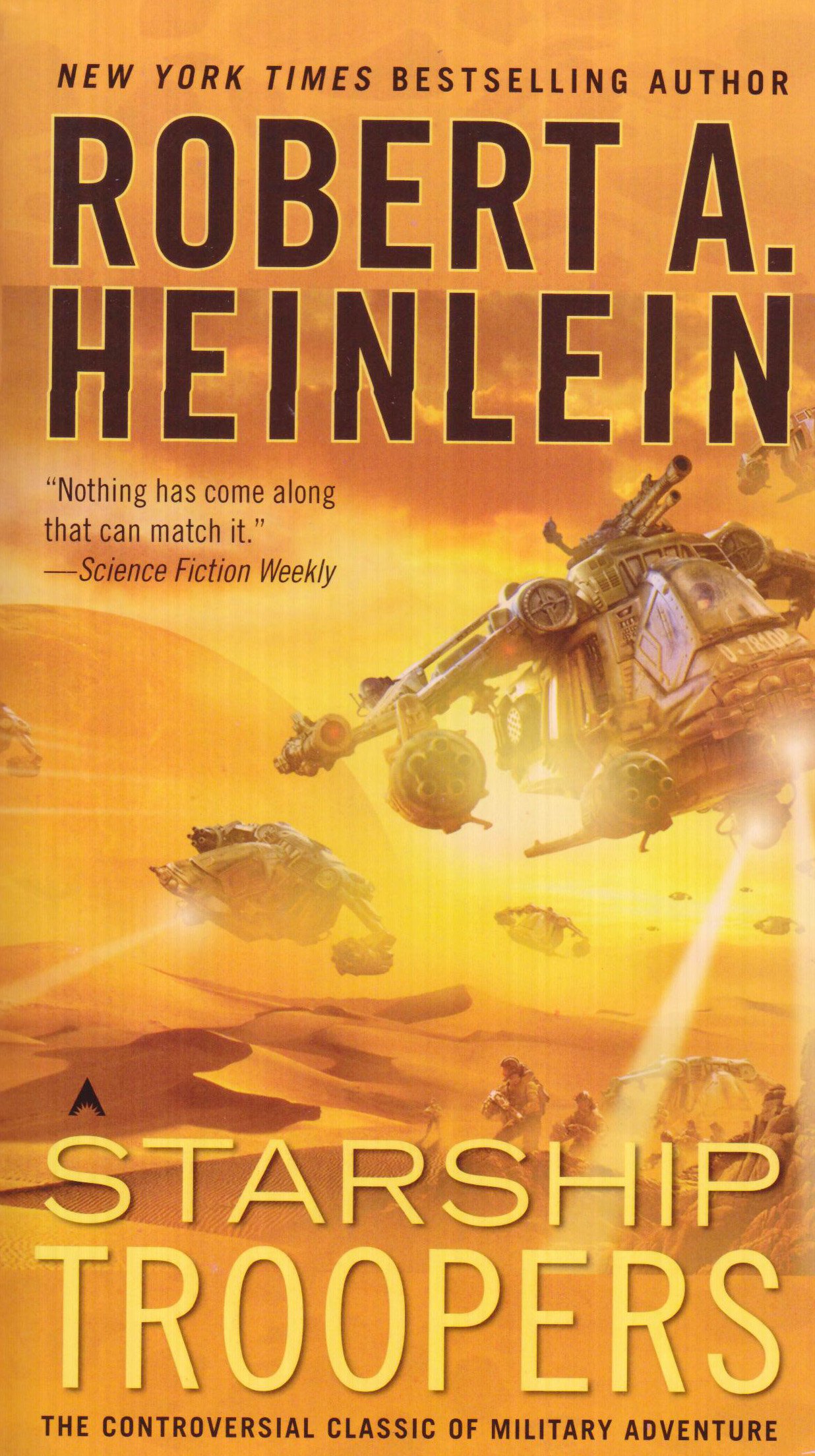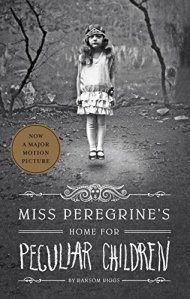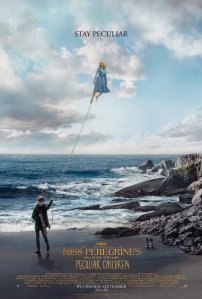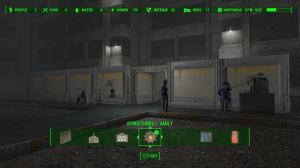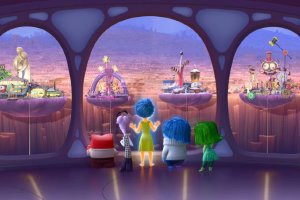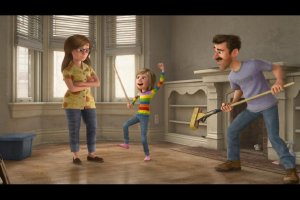Amy opened her eyes to the sound of a hacking cough. Heavily phlegmy, it emanated from deep in the owner’s chest and told of a raw throat and stomach sore with the racking convulsions. The sound of sickness; infection.
The cough was followed by a series of throat clearing noises that unnerved and nauseated Amy, causing her to cringe away before she even realized the import of what she was hearing.
Suddenly, it set in, and she was on her feet in an instant, flipping over in a tangle of blanket and jacket while searching the ground desperately for her backpack and the rifle. Neither were in sight.
Seeking an alternative route to safety, she scrambled to the opposite side of the fire to the point of origin of the coughing sounds, and sprinted away, putting a few trees between herself and her assailant.
The darkness consumed her quickly, and she found a large tree to hide behind and gain her bearings while she figured out how to get her backpack back.
No sound. No one is following me.
‘No sound’ wasn’t totally accurate. The fire was a good bit bigger than the one she remembered building before going to sleep, and it crackled and popped noisily with the heat. But there were none of the crashing and scrambling noises one might expect with a night-time chase through a dark forest.
Unable to ignore her curiosity, Amy peeked around the tree. Nothing doing: too many trees blocked her vantage point, so she crept closer to the small clearing in which she’d built her fire, padding as lightly as she could manage across the dark, wet, snow and leaf-covered forest floor.
Gradually, the fire came back into view and Amy thought she could make out the shape of a person on the other side. The fire, burning a healthy three feet high both obscured the person with its flames and blinded Amy to the relative darkness on the other side. Amy drew still closer, stomach in her throat as her heart pounded loudly in her chest.
“It’ll be a lot easier to talk if you just come over here,” came from across the fire.
Amy just about fell over from the shock of spoken words after so long with nothing but her own running commentary. Literally speaking, she took two quick steps backward but caught herself and dug deep within her personal well for the courage to stand her ground and reply.
“Who are you? How did you find me?” Amy replied.
“You shot a gun and went charging off into the woods. Then lit a campfire. Stealthy, you were not.”
The voice was gravelly from disuse and inflected with sickness, but unavoidably familiar. Amy edged her way around the fire.
“Okay. Fair point. But what are you doing here? What do you want with me?”
“Oh, I was just wandering around. Enjoying all that nature has to offer. And,” he said, as Amy stopped dead in her tracks, stunned into silence.
“I wanted to see my little sister.”
Tears began to flow down Amy’s cheeks as she stared at his face in the flickering light. All of the emotional torment and the horror of the past couple days bubbled to the surface at the sight of her brother’s face. Her one connection to the past and the world she lost. He was here. Right in front of her. Jake
She rushed to her brother’s side, but the hug she was prepared to give died on her arms as Jake completely failed to react to her movement. Jake had a large haunch of meat in his hands, and sat still, chewing slowly as he stared into the glowing embers at the base of the fire. A bit of juice dripped slowly down from both corners of his mouth and darkened the chest of the ragged black t-shirt he was wearing.
It was a shirt she remembered well from years ago. SOUNDGARDEN was emblazoned across the chest with the distorted figure of a singer below: the distinct front artwork of Jake’s favorite album, Superunknown. Jake had won the t-shirt in a radio trivia contest in junior high and wore it often, and reverently in the years that followed.
That album had been blaring that night, and Amy shivered at the memory of Jake screeching to a halt at the sight of Amy, dead-eyed and swaying on her feet at the curb in front of a massive house party. As he rushed around the side of his battered Nissan, she came back to herself slightly and fell into his arms, shaking. He helped her into the car gently and quieted the music with a swipe of his hand as he pulled away toward home.
“You owe me big time!” he said, laughing. “Dad would lose his mind if he knew his precious little girl was stumbling drunk at a massive party. And Cara–unbelievable. The balls on her to throw a party like that with neighbors so close by. You’re lucky I got there before the cops did.”
He was right about that, as they both later found out. Police showed up shortly thereafter and sent kids running into the night, with mixed results. Cara herself had got stuck with community service and a mandatory series of alcohol counseling sessions, as well as something of a parent-imposed exile at home for most of that school year. Amy considered the outcome little more than a slap on the wrist for Cara considering the way the night had gone.
“How much did you have to drink, anyway?” he asked, glancing over at her.
Amy just stared at the dash. Jake decided to try another tack.
“It’s gonna be fine, though. Dad will never find out; he thinks you were at Rebecca’s anyway… And I’m sure mom went to a party or two in her time, she would…”
“Understand,” he’d meant to finish, but he trailed off and looked over after a hitch in Amy’s breath. Jake had been only 7 when Helen Riker died in a brutal car accident. Her car had slammed into a tractor-trailer at 60 mph after failing to stop at a red light. Everything inside the car had been destroyed, including Amy’s car seat, mercifully empty on that occasion, as she and Jake were at home with her dad, Billy. Jake and Amy had never been privy to all of the details, but he had guesses based on stories he’d heard about her lifestyle and mental state.
Jake’s road to recovering from the grief of this loss had been long, windy, and full of potholes. But he had made good progress in moving on as his formative teenage years rolled around, and he was able to talk rationally about her now. Amy, meanwhile, had never quite moved on. Despite being only two years old at the time of the accident, she deeply felt the absence of a female authority figure in her life in a house with two boys.
Realizing his mistake, Jake reached over and rubbed Amy’s shoulder.
“Hey. You know, I…” he trailed off again, and blew a sigh through his nose. “I love you.”
Amy clenched her shoulders hard and turned to look out the window, unable to bear her brother seeing her emotions on her face.
—
Amy took a step back from her brother, letting her proffered hug drop to her sides as another fit of coughs struck Jake and he hunched over with the effort of clearing his airway. The coughing failed to subside, seeming to gain intensity until Jake was wheezing and choking.
Finally, after what seemed like minutes, Jake wiped at his mouth and turned to her, grinning lopsidedly. Amy started to mirror him, scraping at her brain for a joke to downplay the obvious distress he was in, when she frowned suddenly. Jake’s teeth, once perfectly straight and blinding white, were a jagged mess of yellow chips covered in glistening blood.
Amy took two more steps backward, mouth agape, as Jake smiled more broadly and began to stand, dropping the haunch of meat he’d been gnawing at. It hit the ground with a cold thump, and Amy looked at it in horror as she realized what it was: a human arm, torn free at the shoulder. The stumps of two white bones hung out just below the elbow, where Jake had been slowly working at it.
On his feet now, Jake took a step toward Amy, eyes wild. As he came closer, Amy could see the same green mottling splashed across his face that she had observed on the boy in the house. His black t-shirt was covered in dark spots that looked suspiciously like blood stains, and as he moved she could see a score of rips and holes across its surface. His forearms were covered in lacerations, scabby and tinged with the same pickle green as his face. Amy cringed back from him, feeling like she was moving in slow motion, unable to escape his inevitable pursuit.
“Where’s my hug, Amy? I just want to hold my sister again. Hold you clooose.” Jake motioned a lover’s embrace as he lurched toward her steadily.
A dozen more steps of backpedaling, and Amy’s back hit a tree. She scrambled to get past it and her heel caught a thick root, sending her sprawling, unable to find her balance on the slick, icy leaves.
In an instant, Jake was on top of her, his breath fetid and heavy. His eyes were bloodshot with red and green as he looked down on her eagerly, smiling wide.
He leaned in close, then whispered in her ear, “We’ll never be apart again.”
A low, throaty chuckle escaped his lips and washed over her in foul odor. Pinning her painfully to the ground he lifted her shirt from her waist, licked his lips, and dug viciously into her stomach, laughing as he pulled her intestines loose with his teeth.











